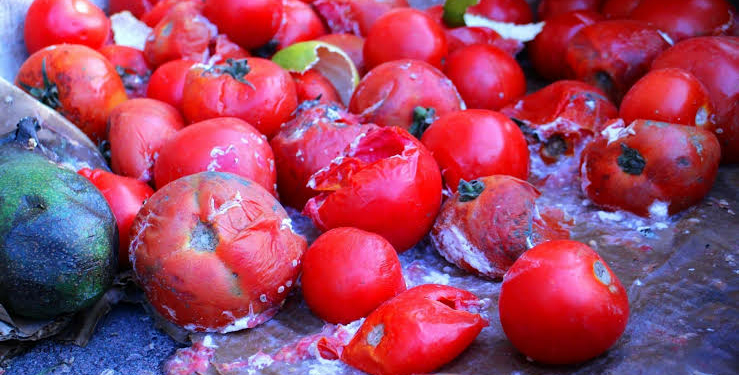Nigerians turn to rotten tomatoes, ‘baje’, pastes, and grinded pepper mixed with ‘kolanuts’ due to scarcity and high cost of making ‘soup

On a Monday morning, WITHIN NIGERIA journalist SODIQ LAWAL CHOCOMILO visited three popular locations in Ilesa, a town in Osun State where tomatoes and peppers are sold in large quantities. The reporter also visited different locations in two markets, namely Sabo and Atakunmosa, where he engaged some pepper sellers and those who went to the market to patronize them.
This story illustrates the scarcity and high cost of tomato and pepper (rodo, tatashe, and son mbo) in the town, the complaints, lamentations, and struggles of Nigerians at the market, and how some people had to adopt tomato paste, nearly spoilt tomatoes and grinded pepper allegedly mixed with kola nuts as an alternative.
Surprisingly, both sellers and buyers are grumbling about the high cost of tomatoes and red peppers. This reporter witnessed some bitter exchanges and banter between sellers struggling to maintain their selling price while buyers struggled to either reduce the cost or increase the number of peppers per count. Beyond the cost of tomatoes and peppers, this reporter interviewed some pepper sellers, and they explained the scarcity and high cost of tomatoes and red peppers.
Ibrahim, a 42-year-old man whose pepper shop is located a few kilometers away from the residence of Oba Gabriel Adekunle Aromolaran, the Owa-Obokun of Ijesaland, could be seen sweating profusely when this reporter visited. Ibrahim was surrounded by five customers who wanted to buy tomatoes and peppers. As fast as Ibrahim was, the population of customers kept growing because those he attended to did not leave the spot. Some customers were seen decrying the high cost of tomatoes and red peppers, while others could be seen counting the number of peppers.
A woman in her mid-forties who was later identified as Ronke could not hold her anger after she bought some pieces of tomato at the rate of N500. What is this for God’s sake? A worried Ronke innocently inquired. She was seen begging Ibrahim, the pepper seller, to increase the quantity of peppers she bought. Ibrahim, who appeared not to be worried about her pleas, could be seen attending to other customers. Ronke and others who had bought pieces of tomato interaction as he journeyed to Atakunmosa Market.
At Atakunmosa Market, this reporter visited different locations where they sell tomatoes and peppers and observed the struggle between sellers and buyers. At each stall, it was a tale of lamentation, banter, and a spree of abuse between pepper sellers and their customers. The quantity of tomatoes and peppers in relation to the price was a factor. The insistence of sellers to sell at a high cost was inversely proportional to the appellation of buyers to buy large quantities at a reasonable cost.
Bimbo, a 31-year-old woman, was seen in one of the stalls this reporter visited, decrying the high cost of tomatoes and pepper as she put other goods she had bought inside a bag. Bimbo was arguing with the pepper seller about the quantity of pepper she bought at the rate of N5000. ‘Everywhere is dry. There’s no money. People cannot build houses from their earnings. They still can’t eat well, either. This is the hardest moment I have ever experienced as a citizen of this country, Bimbo lamented.
Bimbo, a food vendor, decried that the high cost of tomatoes and peppers has negatively affected her business because she doesn’t know how to increase the prices of cooked food that have already gone up due to inflation.
According to Bimbo, the economy has gone so bad that Nigerians cannot afford the good tomatoes and peppers that are necessary for balanced diets.
At Sabo Market, the situation is no different, as this reporter observed the struggle between pepper sellers and their customers at locations he visited. A 42-year-old woman identified as Omolola told this reporter that she came to the market to buy ‘nearly spoiled tomatoes, also known as ‘Eesa, because she could not afford to buy good tomatoes.
Omolola, who is also a food vendor, bitterly complained about how her expected gains from the food business had been reduced as a result of the high cost of rice, beans, and others. She disclosed that the high cost of tomatoes and peppers would only add to her worries. Omolola is not alone in her worries. This reporter observed that most buyers were terribly shocked at the new development.
After this reporter trekked to Sabo Market to observe the situation, he later moved down to Bonke, Coca-Cola, to finish his discussion with Ibrahim, but he has since gone out as of the time this reporter arrived at his stall. This reporter waited for 30 minutes but later left after Ibrahim did not show up. He trekked down to the stall of another pepper’s seller, where he inquired about the scarcity and high cost of tomatoes and peppers.
In an interview with WITHIN NIGERIA, an online news platform, Mallam disclosed that the scarcity of tomatoes and peppers led to the high cost, stating that if there was no scarcity of tomatoes and peppers, there would not be a sudden increment in cost.
According to Mallam, fuel scarcity, which happened some weeks ago, affected the transportation of farm produce, especially tomatoes and peppers, from north to south, and it later became an issue after sellers had already sold out their reserves.
Mallam disclosed that irregular rainfall in the North and the attack on tomato farms by pests or insects were the primary factors responsible for the scarcity, which led to the high cost of these items.
The majority of farmers who cultivated tomatoes and peppers in the North that I know and have relationships with complained bitterly about the destruction caused by pests or insects on their farms, which reduced the expected harvest, Mallam further disclosed.
While attributing the primary cause of scarcity to pests and insects, Mallam urged the government at all levels to support farmers, make provisions for pesticides to curtail the widespread tomato infestation, boost food security, and rescue the country from hunger.
If every farmer had access to pesticides and extensive support from the government, the current situation we are in would have been avoided. It is so sad that we always act when issues happen. We need to step up our game and focus more on prevention than management. We, Nigerians, really suffered, but I’m grateful that things are changing. By tomorrow, I hope we will have access to more tomatoes and peppers, and the cost will surely come down, Mallam added.






